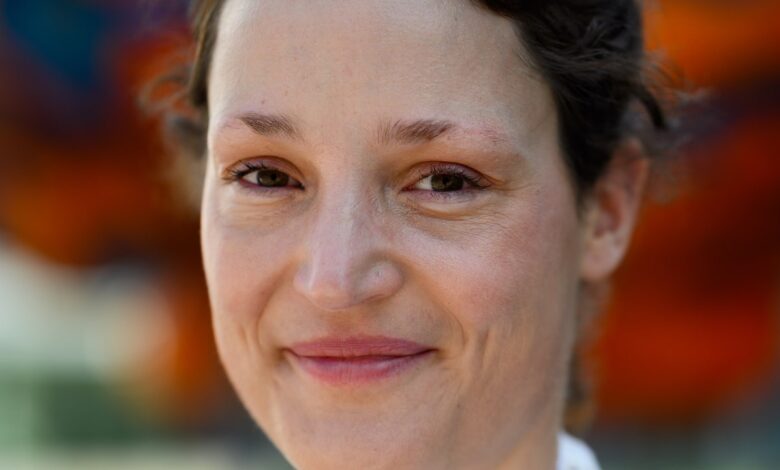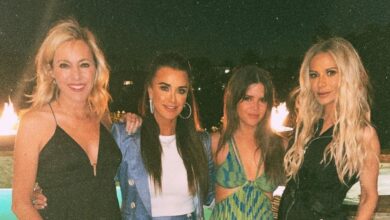Vicky Krieps Just Won the Biggest Award of Her Career. She’s Feeling Conflicted

Every year since the Toronto International Film Festival’s Tribute Awards launched in 2019, at least one of the honorees has gone on to win an Oscar: Joaquin Phoenix, Anthony Hopkins, Jessica Chastain, Brendan Fraser—you get the idea. On Sunday night, Vicky Krieps will join TIFF’s illustrious class for her exceptional performance in Viggo Mortensen’s romantic 19th-century Western The Dead Don’t Hurt (currently seeking distribution). The Luxembourg-born star’s placement here makes all the sense in the world—she’s been steadily building her profile on the global cinema stage, from her breakout in Paul Thomas Anderson’s Phantom Thread to her celebrated lead turns in Bergman Island and Corsage, and she reaches new heights as a French-Canadian immigrant paving her own way on the American frontier in The Dead Don’t Hurt. But I’ve known Krieps for a few years now, and particularly learned about her aversion to the spotlight. Given this award’s history, when I saw TIFF announce her as this year’s recipient, my first thought boiled down to: Is she ready for this?
Over morning tea in her Toronto hotel, Krieps persuasively argues in the affirmative—mostly. There is a part of her, she tells me, that is ready to “jump off the boat,” hit the abort button before her star rises too high to reverse it. But bit by bit, she’s learning to navigate a public-facing, scrutiny-laden industry as her unapologetic self. It’s a confidence that is revealing itself in her performances too. Watch The Dead Don’t Hurt and you’ll see one of the great actors of her generation only getting better, more exciting, more alive. She’s done hiding.
Vanity Fair: I really liked this movie. It surprised me.
Vicky Krieps: Ah, yeah. Right? It’s so good you say that because I feel bad about thinking that way. You go , “Okay, another Western.” Viggo is a man and he’s been in these very classical Western-man stories. Even he’s said it; it’s not his fault. But in the movie, there’s very masculine thinking. Doing it, I was sometimes wondering: Is it strong enough for the woman? In the end, she’s still only a woman in a man’s world. Viggo and I were never fighting, but we can be very stubborn and very soft. I think we both have this duality. I always want to say what I think, and I always believe that no one can tell me what to do. Then when I saw the film, I got hit with this, I don’t know—a wave of love. I understood. Now, I have to say I’m happy it’s this way and not any other way. Because any other way would’ve been, I think, not honest. It would’ve been not his film.
Given that you had that initial feeling about it, what made you want to do it?
I was in Arizona shooting a movie the year before, and I would always drive around in the car to the set across this huge desert. Suddenly I started having these visions of blood in the ground. I was thinking a lot about how much blood has been shed into this same soil on both sides. The US is built on this terrible, heartbreaking chaos where everyone lost so much blood on every side. You can’t even start trying to understand. This followed to—and what I’m going to say is true, and I know it sounds crazy—me thinking, “What would I want to do next? The only thing I think I would want to do is a Western.” I’m not joking, I really thought that. I saw myself in this desert on a horse, and the same week I got an email from my agent: “Viggo Mortensen wants to talk to you.” I felt like I had to do it.
I read it and I really liked the craziness of the vision. It’s not conventional, and I always need something that has to be unconventional. [Laughs] Then again, even on the first reading, I had troubles with the more conventional, typical western side of the story, that the woman gets raped. A part of me is always like, “But why? Of course she can be stronger. Why doesn’t she get out?” I got these feelings when I was a child watching movies, every second, like, “Why is she not this?” Do you know what I mean? In the old movies, they were really bad. I would be so furious. But I went for this because I believed, if anything, that’s why the movie needed me. This might sound like I think I’m important but I don’t. I just know that I cannot be corrupted. That’s worth something.
Tell me if I’m off base here, but I thought of the character in some ways like a metaphor for your career a little bit. Last time we spoke, we talked about the aftermath of Phantom Thread and your resisting a certain Hollywood trajectory. In this movie, we meet Vivienne in higher society with this man, and she’s just like, “No. That is not for me.”
Yeah, totally. It felt very personal. Also the suffering: There’s a lot of suffering alone. She only cries when Olsen is gone. That’s something I know a lot because as an actor you are not allowed to suffer. You can suffer in the roles, but everything outside, you come on set and it’s like, “Let’s go!” I bring the good energy no matter what happens—if the ship is sinking, I’m going to continue to play like the orchestra on the Titanic. That’s how I feel often. And this is not because people are mean. People are also mean, but let’s leave that aside. As an actor, you are the character. And then as yourself you have to carry everyone. And as the character, you have to carry the movie. There’s no space anymore for you to have real feelings of your own. And that’s something that I think is very much in the film.
I did think of my other movies. I did had one take where I stood there and I thought, “Wow, this is the first time I let myself show it.” I don’t think I’ve ever shown it. Rarely I get this outside view so I thought, “Wow, I’m really, really letting go. I’m really letting something show.”




